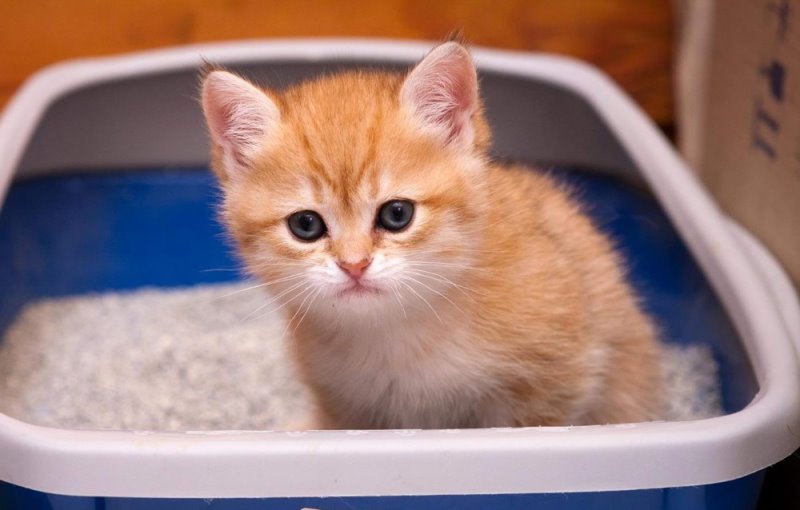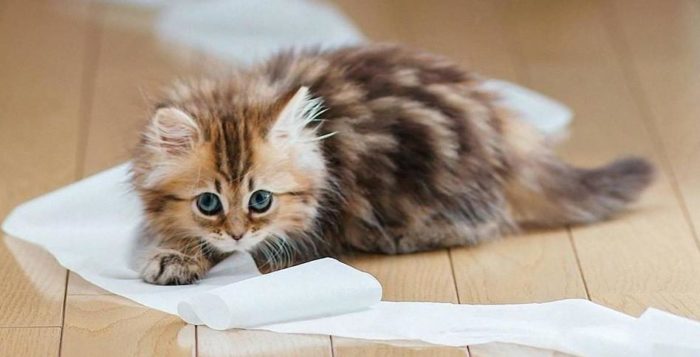Digestive disorders in pets – a problem that has faced all, without exception, lovers of these pets. Most often, the pet’s body copes with it independently, no intervention is required. It’s another matter when the kitten is constipated: the baby’s body often needs help.
Contents
If the kitten has constipation: what to look for
In this article, we will not consider the causes of this pathological condition, but we note that most often pathology is somehow related to the characteristics of nutrition (including the mother of kittens).
Before you start active actions, you need to analyze the following nuances:
- When and after which the pet stopped defecation.
- How long it lasts.
- Whether antiparasitic treatments were performed, and when, in particular, was the latter.
- Whether the baby’s diet has recently changed, and whether this has happened too sharply.
All of the above will certainly help to quickly identify the causes of constipation. In addition, we recommend that you contact the veterinarian immediately if:
- The kitten does not only push, but constantly, mewing pitifully.
- On the excreted pieces of feces visible abundant clots of blood and mucus.
- With palpation of the abdomen, a strong tension of the abdominal wall and soreness are found.
- Specialists will also help if the kitten does not chew for more than three days.
If the appearance of the abdomen is observed during closure, self-treatment can not be done.
Such a sign often indicates one of two most dangerous pathologies:
- Foreign body in the intestine.
- Complete coprostasis, which can not be cured at home.
- If, in these cases, try to “help” the pet by giving it the means that strengthen the peristalsis of the intestine, the kitten will most likely die from a rupture of the intestines. So with a strong swelling of the stomach, you should immediately call a veterinarian, without wasting time on dangerous attempts at self-treatment.
What to do at home: the main tasks of the owner
The primary goal is to provide the pet with an unlimited amount of clean drinking water. The more the baby drinks, the better will be moisturized semi-dry feces in the intestines, and the more chances to cope with constipation yourself.
If the kitten does not drink, or if the thirst is not too well expressed, you will have to drink it by force. In such cases, we strongly recommend that you immediately seek help from a veterinarian, since the pet will almost certainly require intravenous fluids.
The second most important task of the owner is to compose a diet enriched with dietary fiber, stimulating intestinal peristalsis. In addition, it is necessary to draw up a strict feeding schedule, which will help restore the digestive system of the kitten to its normal state.
For this you can use two simple folk remedies: pumpkin puree and bran. It is best to use mashed potatoes, since its sweetish taste and pleasant consistency do not cause rejection in the animal, and therefore the baby will not have to be forcibly fed. In a day, a kitten can be given up to one teaspoon of this remedy.
PEREBARSCHIVAT NOT WORTH, SO HOW IN THIS CASE CAN BE OBTAINED DIRECTLY ANOTHER RESULT (Ie ZAPOR CHANGE BY PONOS, WHICH FOR KITTEN IS MORE DANGEROUS).
With bran in the treatment of constipation, kittens need to be more careful, since they can greatly irritate the pet’s digestive tract. Be sure to consult a veterinarian when including in the diet of a kitten any food additives!
With a kitten it is necessary to play more often. Do not forget that physical activity is the guarantee of animal health (and not only). The more active the pet will run and jump, the more active will be the peristalsis of his intestines.
We do not recommend playing with the baby, if he has recently eaten.
- First, it can aggravate constipation.
- Secondly, physical activity under the condition of a tightly stuffed stomach greatly increases the risk of curvature of the intestines and death.
Finally, you need to regularly and carefully watch your pet, noting any oddities in his behavior. If, despite all the efforts of the owner, the condition of the animal does not improve within two days or more, consultation of the veterinarian is necessary.
What can not be done?
It is very undesirable to cope with constipation in kittens using the following techniques:
- Do not give the baby diluted cow’s milk. Yes, constipation such a remedy really “punches”, but only stasis of feces in such cases often gives way to a violent and prolonged diarrhea. For kittens, it is deadly, as it leads to a quick death from dehydration. In addition, this approach threatens with severe consequences for the liver of the animal.
- Do not give vegetable oil to the kitten. This is a hard blow to the liver, and from constipation this remedy does not help very well.
- Never and in no case should you give kittens castor oil. Perhaps, the problem with constipation and will be solved, that’s only at the cost of kitten death.
- It is strongly advised not to use porridge for controlling constipation in kittens!
Practical advaice
So, here’s what to do at home:
- If the constipation was not caused by something really serious (foreign bodies in the intestine, for example), then the effect of the enema will be visible in just half an hour.
- If there is no such “outlandish” remedy in the home medicine cabinet, a warm physiological solution (about 37 ° Celsius) will work. It is administered by 5 ml per kilogram of live weight.
- A good effect is docusate sodium (5 ml per kitten).
- Excellent helps lactulose (its pure solution is sold in the form of Dufalac). One kitten takes 5 ml. The agent is diluted with warm boiled water in a ratio of 1: 1.
Vaseline oil with constipation
You can use Vaseline oil, but you need to observe a number of simple rules:
- It should be given in a dose of 1 ml per kilogram of live weight, but experienced veterinarians advise to reduce the dosage to 0.6-0.7 ml per kilogram of weight.
- A single dose should not exceed 5 ml, but in practice it is better not to give the kitten more than 3.5 ml at a time.
- In addition, during the day the animal should not receive more than 17 ml of the drug, but this – in extreme cases!
If within three hours from the moment of oil supply no positive shifts in the pet’s body are observed, it is possible to repeat the delivery of the medicine once. In the case when this measure did not bring any results, further self-treatment should be considered inexpedient. Need to urgently seek help from a veterinarian.
How correctly to put a kitten to an enema
In all the cases described above, the medicinal substance is introduced into the kitten’s body using an enema. The problem is that not all owners know how to do it right. Poor performance of this procedure is fraught with serious consequences, up to perforation of the rectum.
To avoid this, the following recommendations should be observed:
- First, you need to get the smallest syringe from those used in pediatrics to evacuate intestinal gases and mucus. Such pears are made of very soft hypoallergenic rubber, and their small volume will not allow to introduce too much volume of medicinal substances into the rectum to the animal.
- That the tip of the syringe does not injure the rectum tissue, it should be smeared with vaseline oil.
- The medicine is necessarily heated to 37 ° Celsius! Failure to comply with this rule and the introduction of cold medicinal compounds are the result of severe injuries, including rupture of the rectum.
- With the introduction of the drug, you do not need to sharply compress the syringe, splashing out all the contents at once. It is necessary to do this carefully, introducing the drug in small portions.
- Ideal – ready-made micro-enema.
Сonstipation in a newborn kitten
Cases when newborns suffer from constipation, veterinary practice does not happen so often, but they are among the most difficult. If nothing is done within two days, the baby may well die from intoxication. Most often, constipation in newborns occurs in cases where the cat for some reason does not really care for the litter.
THE PROBLEM IS CONCLUDED THAT THE FIRST SOME DAYS AFTER THE BIRTH … KITTENS CAN NOT WRITE AND WRITE MOST.
To the organs of their excretory system worked in “normal mode”, mechanical stimulation of the genital area is required.
Under normal conditions, the mother does this, licking the crotch of the kittens every three or four hours. Otherwise, the owner must fight the constipation of the newborn:
- Take a cotton pad moistened with warm physiological solution.
- Starting from the top, massage the tummy. Do this by circular motions, gradually descending to the groin area.
- Do this every four hours, at least! Kittens drink a lot of milk, so their tiny digestive tract is quickly filled with “production waste”.
- If there is already a lot of “waste” in the kitten’s body, literally a couple of seconds of massage is enough, after which the constipation immediately passes.
What to do if the constipation of a week-old kitten
In general, all the recommendations listed above are relevant. Of course, by this time the kittens should already be able to relieve themselves, but still they will not be hindered by additional stimulation.
In addition, it is necessary at least twice a day to do a tummy massage for them:
- To do this, use the same cotton pad moistened with saline.
- Lay the kitten on its side for the procedure. In order to be more convenient, it is advisable to perform the procedure together: the baby is unlikely to lie quietly, and his extra activity is of no use.
- Massage should be done by circling the belly. Circles should, gradually tapering, close closer to the groin area.
Such a simple procedure, if performed regularly enough, stimulates intestinal peristalsis and completely prevents new relapses of constipation in a week-old kitten.
Constipation in a month-old baby
In this case, all the above recommendations are relevant. To eliminate constipation, the following techniques can and should be combined:
- Enemas. We recommend using lactulose, since it gives not only pronounced, but also a mild effect, without overloading the digestive system of the baby.
- Regular abdominal massage for four days, and the procedure should be followed at least four times a day.
- Every day, a kitten is given a teaspoon of pumpkin puree, feeding it from a spoon.
Constipation in kittens in 2-3 months
In 2-3 months the kitten can be technically considered “almost adult”, so to eliminate coprostasis, it can use more funds for cats.






















